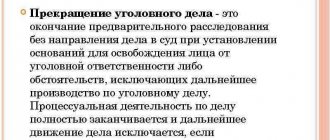Concept of criminal prosecution
Criminal prosecution is a procedural activity carried out by the prosecution in order to expose a suspect accused of committing a crime (clause 55 of Article 5 of the Code of Criminal Procedure of the Russian Federation).
However, the legislator in the Code of Criminal Procedure of the Russian Federation designated criminal prosecution both as an activity (clause 55 of Article 5 of the Code of Criminal Procedure of the Russian Federation) and as a procedural function within the framework of the “principle” of adversarial law (Article 15 of the Code of Criminal Procedure of the Russian Federation).
However, it seems obvious that
- the procedural function of the prosecution, as well as the opposite function of the defense, is limited by the procedural status of the person or body performing it, as well as the person in relation to (in whose interests) it is carried out, whereas
- procedural activity to expose the person who committed the crime, in other words, criminal prosecution, is carried out regardless of whether the figure of the suspect or accused has appeared on the legal horizon or not.
Thus, criminal prosecution is a state-authoritative, public, organizing procedural activity of competent state bodies and officials to establish the event of a crime, expose the person or persons guilty of committing a crime, as well as to establish other factual circumstances of the case, their legal assessment and issuing relevant acts of criminal proceedings containing the wording of the charges addressed to specific participants in criminal proceedings and justifying it before the court.
Criminal prosecution is aimed at solving the general problems of all criminal proceedings in order to achieve its goal. The initial, or primary, in this case is the very fact of committing a criminal act, which allows us to assert that criminal prosecution begins from the moment a criminal case is initiated both upon the discovery of a crime event and in relation to a specific person.
As a rule, criminal prosecution is carried out by the prosecutor, investigative and inquiry bodies.
Based on the above, criminal prosecution as a procedural activity includes:
- actions of investigative and inquiry bodies, consisting in collecting only incriminating evidence, applying coercive measures to ensure the incrimination of a person and the application of punishment to him;
- actions of the state prosecution authorities, which are aimed at justifying the accusation before the court, convincing the court, based on the totality of both incriminating and exculpatory evidence, of the guilt of the accused and the need to apply appropriate punishment to him.
At the same time, maintaining state charges in court is only an integral part of criminal prosecution.
Characteristic signs of criminal prosecution:
- procedural activity (carried out in the forms provided for by the criminal procedure law);
- carried out by competent government bodies and officials (only they have the right and obligation to establish the factual circumstances of the case, give them a legal assessment and make appropriate decisions on the case);
- the content of this activity is to take measures to establish the event of a crime, expose the person or persons guilty of committing a crime, as well as to issue appropriate acts of criminal proceedings addressed to specific participants in criminal proceedings and containing the formulation of the charge;
- has a state-imperious, public character, as it is ensured by the coercive power of the state;
- is the main driving force of the criminal process, which organizes the entire process in a specific criminal case and determines the content and direction of the proceedings on it.
Law enforcement features and stages of criminal prosecution
The activity of carrying out criminal prosecution as law enforcement activity is a unique process, which represents the performance by a competent government body and official of the required (established by the rules of law) actions.
Speaking about this activity as a process, one cannot avoid considering the question of the content of this process, which develops in a certain sequence. Taking into account the homogeneity of the actions performed, the goals pursued by them, as well as their relative isolation in time, we can talk about the staged nature of criminal prosecution. At the same time, the sequence of transition from one stage of legal proceedings to another during criminal prosecution is relative, since after exposing the person or persons guilty of committing a crime, as well as after establishing the factual circumstances of the case and their legal assessment, the investigator may need to return to establishing the circumstances cases, carry out any investigative or other procedural actions. In the same way, when making a decision on a case, for example, on the formulation of a charge, the investigator is often forced to return to establishing the factual circumstances of the case and their legal assessment. But, despite the interpenetration and interdependence of these actions, the activities of criminal prosecution are characterized by stages.
Initiation and termination of criminal prosecution
As a general rule, criminal prosecution
- begins from the moment the criminal case is initiated and
- ends with the onset of (release from) criminal liability, when the court, on behalf of the state, finds a person guilty of committing a crime in a final conviction or not guilty in an acquittal, or the application of compulsory medical or educational measures to the specified person.
However, there are exceptions to the above rule regarding the termination of criminal prosecution, namely:
- termination of a criminal case entails the simultaneous termination of criminal prosecution (Part 3 of Article 24 of the Code of Criminal Procedure of the Russian Federation); at the same time, the criminal case is subject to termination in the event of termination of criminal prosecution against all suspects or accused, with the exception of cases where it is established that a person is not involved in the commission of a crime (clause 20 of article 5 of the Code of Criminal Procedure of the Russian Federation);
- criminal prosecution is terminated upon reclassification of the act committed by the perpetrator (Article 175 of the Code of Criminal Procedure of the Russian Federation); recharacterization of an act (crime) means changing or adding charges or terminating criminal prosecution in the relevant part of the charged crime;
- the actual termination of criminal prosecution (Article 27 of the Code of Criminal Procedure of the Russian Federation) - if the grounds for termination of criminal prosecution do not apply to all suspects or accused in a criminal case, then the investigator issues a resolution to terminate the criminal prosecution against a specific person. However, the criminal proceedings continue.
Procedure and rules of attraction
If we talk about private or private-public types of criminal prosecution, then either the victim himself or his legal representatives (guardians or parents) can initiate the procedure for starting it.
They are required to write a statement and indicate in it the facts and reasons for starting the investigation. Prosecution of a public nature is initiated by the prosecutor, investigator or law enforcement agencies . The prosecutor can also draw up a resolution to terminate the criminal prosecution according to the established template.
It should be noted that there is a separate article in the Criminal Code of the Russian Federation for illegal criminal prosecution - Article 299. It provides for a preventive measure for this crime in the form of imprisonment for up to 10 years .
Timing of persecution
They depend on the type and degree of the offense committed. Art. 78 of the Criminal Code of the Russian Federation establishes the statute of limitations for criminal prosecution as follows:
- for crimes of minor gravity - 2 years ;
- for crimes of average gravity - 6 years ;
- for serious crimes - 10 years ;
- for especially serious crimes - 15 years .
The period begins to count from the moment when the crime itself took place until the court made its final decision on the case. If a citizen commits a new crime, the countdown begins anew.
Types of criminal prosecution
In the Code of Criminal Procedure of the Russian Federation (Article 20), the legislator differentiated the types of criminal prosecution depending on the nature and severity of the crime committed:
- public (cases of public prosecution);
- private (private prosecution cases);
- private-public (cases of private-public accusation).
These types:
- indicate the procedure for procedural activity determined by law, and therefore the basic rules, sequence of actions and nature of decisions at different stages of criminal proceedings;
- determine the dependence of this procedural activity on the will of the parties (according to the degree of such dependence, three categories of cases are distinguished: cases of public, private and private-public prosecution).
Public procedure for criminal prosecution
Proceedings in the vast majority of criminal cases are carried out in a public (or general) manner. At the same time, the independence of criminal prosecution from the position of the parties is demonstrated to a greater extent. If signs of a crime are detected, a criminal case is initiated and criminal prosecution is carried out on behalf of the state (Article 21 of the Code of Criminal Procedure of the Russian Federation), regardless of the wishes of the victim.
The victim, his legal representative or representative may participate in the criminal prosecution of the accused, but they do not have the right to make independent decisions on the case (Article 22 of the Code of Criminal Procedure of the Russian Federation).
The public procedure for criminal prosecution is most consistent with the main goals and characteristics of criminal proceedings - its objectivity and independence from private individuals. The legislator defines this procedure as general ( Part 3 of Article 147 of the Code of Criminal Procedure of the Russian Federation).
Private criminal prosecution procedure
Private criminal prosecution is based on a dispositive principle, meaning the greatest influence of the position of the parties on the final decision in the case.
Private prosecution cases:
- initiated at the request of the victim, his legal representative and representative (as a general rule - part 2 of article 20 of the Code of Criminal Procedure of the Russian Federation);
- are also terminated at the will of the victim who has reconciled with the accused.
Reconciliation is allowed before the court retires to the deliberation room to render a verdict, and in the appellate court - before the appellate court retires to the deliberation room to make a decision on the case.
Categories of private prosecution cases:
part one, and part one
- Part 1 Art. 115 of the Criminal Code of the Russian Federation - intentional infliction of minor harm to health;
- Art. 116.1 of the Criminal Code of the Russian Federation - battery by a person subject to administrative punishment;
- Part 1 128.1 of the Criminal Code of the Russian Federation - libel;
- Part 1 Art. 129 of the Criminal Code of the Russian Federation - insult (lost force).
More details
As a rule, the main prerequisite for the commission of these crimes is a collision, serious disagreements between persons. These are most often acquaintances, connected by family, work or neighborhood. Hostile relations between them are their internal affair, and certain behavior or vocabulary is a kind of tradition. In order to prevent other crimes arising from personal hostility from becoming such a “tradition,” the legislator quite strictly limited the list of private prosecution cases to a minimum degree of harm: the most significant physical damage that can be suffered as a consequence of committing such a crime is minor harm to health.
The main criteria characterizing private prosecution cases:
- the object of the attack is the inherent properties of the individual (health, honor, dignity);
- the reason is an interpersonal conflict (hostile relationship between the victim and the accused);
- maximum damage caused - slight harm to health;
- subjective-evaluative principle (the victim’s own assessment of the act committed against him);
- criminal prosecution is carried out by the victim and depends entirely on his expression of will: he himself puts forward and supports the accusation (Article 22 of the Code of Criminal Procedure of the Russian Federation).
The listed criteria determined the private procedure for criminal prosecution: it is carried out by the victim himself, who, as a private prosecutor, independently puts forward and supports charges in court (Article 22 of the Code of Criminal Procedure of the Russian Federation).
The exception is when:
- the crime was committed against a person who is in a dependent or helpless state (part 4 of article 20 of the Code of Criminal Procedure of the Russian Federation);
- the victim, for other reasons, cannot protect his rights and legitimate interests, including if the crime was committed by a person whose details are unknown (Part 4 of Article 20 of the Code of Criminal Procedure of the Russian Federation);
- the application was filed in relation to a person belonging to a separate category of citizens with professional immunity (deputies, judges, prosecutors, etc.) listed in Art. 447 of the Code of Criminal Procedure of the Russian Federation and subject to criminal prosecution in a special manner (parts 1.2, 4.1 of Article 319 of the Code of Criminal Procedure of the Russian Federation).
At the same time, the investigator and the inquiry officer, with the consent of the prosecutor, have the right to initiate a criminal case even in the absence of a statement from the victim. Criminal prosecution in such cases will be carried out in public, which does not deprive the parties of the right to reconciliation. Nevertheless, the termination of a criminal case in this case will be carried out in a different manner inherent in proceedings in cases of public prosecution (Part 5 of Article 319 of the Code of Criminal Procedure of the Russian Federation).
Private-public procedure for criminal prosecution
Cases of private-public prosecution:
- are initiated only at the request of the victim;
- it cannot be terminated for reconciliation with the accused (the parties can reconcile only before a decision is made to initiate a criminal case).
If a decision to initiate a criminal case is made, criminal prosecution is carried out by the criminal justice authorities in a public manner (Part 3 of Article 20, Part 2 of Article 147 of the Code of Criminal Procedure of the Russian Federation).
Cases of private-public prosecution are listed in Part 3 of Art. 20 Code of Criminal Procedure of the Russian Federation. The list includes elements of crimes without aggravating circumstances, liability for which is provided for by the Criminal Code of the Russian Federation:
- Art. 116 - beatings;
- Part 1 Art. 131 - rape;
- Part 1 Art. 132 - sexual assault;
- Part 1 Art. 137 - violation of privacy;
- Part 1 Art. 138 - violation of the confidentiality of correspondence, telephone conversations, postal, telegraph or other messages;
- Part 1 Art. 139 - violation of the inviolability of the home;
- Art. 145 - unjustified refusal to hire or unjustified dismissal of a pregnant woman or a woman with children under three years of age;
- Part 1 Art. 146 - violation of copyright and related rights;
- Part 1 Art. 147 – violation of inventive and patent rights;
- Art. 159 - 159.3 - fraud, incl. in the field of lending, when receiving payments, using payment cards;
- Art. 159.5 - insurance fraud;
- Art. 159.6 - fraud in the field of computer information;
- Art. 160 - misappropriation or embezzlement;
- Art. 165 - causing property damage by deception or abuse of trust.
Note on articles related to entrepreneurial activities (Articles 159-165)
Criminal cases of crimes provided for in Articles 159 - 159.3, 159.5, 159.6, 160, 165 of the Criminal Code of the Russian Federation refer to cases of private-public order if they are committed by an individual entrepreneur in connection with his business activities and (or) management of his property property used for the purposes of entrepreneurial activity, or if these crimes were committed by a member of the management body of a commercial organization in connection with the exercise of powers by him to manage the organization or in connection with the implementation of entrepreneurial or other economic activities by a commercial organization, except in cases where the crime caused harm to the interests of the state or a municipal unitary enterprise, a state corporation, a state company, a commercial organization with participation in the authorized (share) capital (share fund) of the state or municipal entity, or if the subject of the crime was state or municipal property.
Objects and subjects
The subjects here are officials and government agencies that participate in the persecution. First of all, this is the prosecution side. Articles 37-45 of the Code of Criminal Procedure of the Russian Federation refer to the subjects of the prosecutor, investigator, victim and his representatives, private prosecutor, civil plaintiff, etc.
The accused becomes the target, since it is against him that the prosecution is carried out. Its specific type is chosen based on the severity and type of offense committed .






